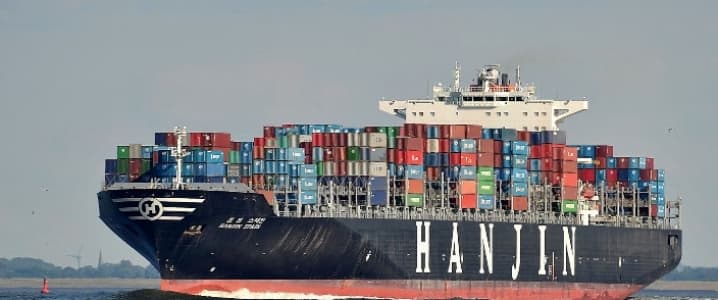The bankruptcy of South Korean shipping company Hanjin is leaving investors scrambling. Recently, the courts in South Korea were asked to decide whether the shipping company should be liquidated, or given a new lease on life via restructuring according to a Wall Street Journal Article reported last week. With limited options available to Hanjin, the company is potentially a concern for investors in the oil and transportation sectors.
Global trade has slowed in recent years, yet the pricing of cargo shipments remained constant. If Hanjin was to close its doors and go bankrupt, price hikes could occur to anything shipped overseas. The South Korean shipping company is one of the largest shipping lines in the world, and if they were to go bankrupt, the consequences would likely be severe capacity issues, and strains on other shipment companies. With cargo space at a premium, shipping lines are calling for price increases that should have been implemented years ago. Additionally, large customers who use Hanjin to ship goods may have to turn around and use other transportation methods. It’s unclear how the situation will play out, but a possible implication of this is greater demand for air freight services. By extension, this could lead to a greater demand for oil, since airplanes use more fuel than ships do per pound of goods transported each mile. In theory then, this could lead to a rise in oil prices due to the higher demand from airplane
traffic needs.
On the other hand, if the company were to fail, this could potentially lead to a lack of confidence in international shipping firms in the industry. That might cause U.S. retailers to turn more towards products manufactured closer to home – in the U.S. and Mexico. That’s a trend that has already been given a lot of press in recent years, but the Hanjin situation might further exacerbate it. To the extent that international trade with China and Asia slows, that would result in a demand-side related fall in oil use leading to a lower price for oil. Global trade has already been facing slumps and the outlook for trade is not great – witness for instance, the desperation by China at the recent G20 Summit when the country called for a new strategy to lower trading costs, and provide an improved platform in trade services, as well as augment trade finance. A decrease in trade with China would cause U.S. demand for oil to fall as products were manufactured closer to home and needed less fuel for transport. Depending on how businesses that use Hanjin react to their impeding failure, oil prices could increase or decrease. For the U.S. market, Hanjin processes nearly 8 percent of the trans-Pacific volume. If these goods had to be transported via airplane for retailers, demand in the vehicles and oil would greatly increase. Yet, if retailers begin sourcing goods closer to home then this could create long-term downward pressure on oil prices Either way, investors and supply chain professionals need to keep a close eye on this important but under-the-radar sector of the world economy.
By Michael McDonald of Oilprice.com
More Top Reads From Oilprice.com:
- Can An OPEC Deal Influence Oil Prices At All?
- Why Is Big Oil Backing Clinton Over Trump?
- The Next Sector To Recover From The Oil Price Crash


















